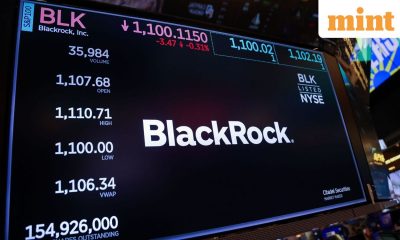

Metaverse
Welcome to the era of AI nationalism – Crypto News
Ever since OpenAI , an American firm, launched ChatGPT, its human-like conversationalist, in November 2022, just about every month has brought a flurry of similar news. Against that backdrop, the three latest announcements might look unexceptional. Look closer, though, and they hint at something more profound. The three companies are, in their own distinct ways, vying to become AI national champions. “We want AI71 to compete globally with the likes of OpenAI”, says Faisal al-Bannai of Abu Dhabi’s Advanced Technology Research Council, the state agency behind the Emirati startup. “Bravo to Mistral, that’s French genius,” crowed Emmanuel Macron, the president of France, recently. ChatGPT and other English-first LLMs “cannot capture our culture, language and ethos”, declared Krutrim’s founder, Bhavish Aggarwal. Sarvam started with Indian languages because, in the words of its co-founder, Vivek Raghavan, “We’re building an Indian company.”
AI is already at the heart of the intensifying technological contest between America and China. Over the past year they have pledged $40bn-50bn apiece for AI investments. Other countries do not want to be left behind—or stuck with a foreign critical technology over which they have little control. In the past year another six particularly AI-ambitious governments around the world—Britain, France, Germany, India, Saudi Arabia and the United Arab Emirates (UAE)—have promised to bankroll AI to the collective tune of around $40bn. Most of this will go towards purchases of graphics-processing units (GPUs, the type of chips that makes AI intelligent) and factories to make such chips, as well as, to a lesser extent, support for AI firms. The nature and degree of state involvement varies from one wannabe AI superpower to another. It is early days, but the contours of new AI-industrial complexes are emerging.
Start with America, whose tech firms give everyone else AI envy. Its vibrant private sector is innovating furiously without direct support from Uncle Sam. Instead, the federal government is spending around $50bn over five years to increase domestic chipmaking capacity. The idea is to reduce America’s reliance on Taiwanese semiconductor manufacturers such as TSMC, the world’s biggest and most sophisticated such company. Supplies from Taiwan could, fear security hawks in Washington, be imperilled should China decide to invade the island, which it considers part of its territory.
Another way America intends to stay ahead of the pack is by nobbling rivals. President Joe Biden’s administration has enacted brutal export controls that ban the sale of cutting-edge AI technology, including chips and chipmaking equipment, to adversaries such as China and Russia. It has also barred Americans from sharing their AI expertise with those countries.
It is now coercing those on the geopolitical fence to fall in line. In October the American government started requiring companies in third countries, including Saudi Arabia and the UAE, to secure a licence in order to buy AI chips from Nvidia, an American company that sells most of them. The rules have a “presumption of approval”. That means the government will “probably allow” sales to such firms, says Gregory Allen, who used to work on AI policy at the Department of Defence—as long, that is, as they do not have close ties to China. On December 6th Peng Xiao, who runs a state-backed AI startup in Abu Dhabi called G42, announced that the company would be cutting ties with Chinese hardware suppliers like Huawei, a Chinese electronics company. “We cannot work with both sides,” he told the Financial Times.
China’s AI strategy is in large part a response to American techno-containment. According to data from JW Insights, a research firm, between 2021 and 2022 the Chinese state has spent nearly $300bn to recreate the chip supply chain (for AI and other semiconductors) at home, where it would be immune from Western sanctions. A lot of that money is probably wasted. But it almost certainly helped Huawei and SMIC, China’s biggest chipmaker, design and manufacture a surprisingly sophisticated GPU last year.
The central and local authorities also channel capital into AI firms via state-backed “guidance funds”, nearly 2,000 of which around the country invest in all manner of technologies deemed to be strategically important. The Communist Party is guiding private money, too, towards its technological priorities. Often it does so by cracking down on certain sectors—most recently, in December, video-gaming—while dropping heavy hints about which industries investors should be eyeing instead. The government is also promoting data exchanges, where businesses can trade commercial data on everything from sales to production, allowing small firms with AI ambitions to compete where previously only large data-rich firms could. There are now 50 such exchanges in China.
Elements of this state-led approach are now being emulated in other parts of the world, most notably in the Gulf’s petrostates. Being autocracies, Saudi Arabia and the UAE can move faster than democratic governments, which must heed voters’ concerns about AI’s impact on things like privacy and jobs. Being wealthy, they afford to buy both the necessary GPUs (on which the two countries have together so far splurged around $500m) and the energy needed to run the power-hungry chips.
They can also plough money into developing human capital. Their richly endowed universities are quickly climbing up global rankings. The AI programme at King Abdullah University of Science and Technology, a Saudi institution, and the Mohamed bin Zayed University of Artificial Intelligence (MBZUAI) in Abu Dhabi, the world’s first AI-focused school, have poached star professors from illustrious institutions such as University of California, Berkeley, and Carnegie Mellon University in Pittsburgh. And nearly all of MBZUAI’s graduates, who number a couple of hundred, stay in the region to work at local firms and labs, says its provost, Timothy Baldwin (himself lured to the Middle East from the University of Melbourne).
The Gulf approach is producing results. The capabilities of the Falcon model, first built by a team of 20 or so engineers, rival those of Llama 2, the most widely used “open-source” model devised by Meta, an American tech giant. AI71 plans to improve its open-source models using national data sets from fields including health, education and, some day, perhaps oil. “In the last 50 years, oil drove the country…now data is the new oil,” says Mr al-Bannai.
A third group of governments is combining elements of America’s approach with those of the Chinese and Emiratis. The EU has its version of America’s incentives for domestic chipmaking. So do some member states: Germany is footing a third of the €30bn ($33bn) bill for a new chip factory to be built there by Intel, an American chipmaker. Outside the bloc, Britain has promised to funnel £1bn ($1.3bn) over five years to AI and supercomputing (albeit without going into detail about how exactly the money will be spent). India’s government is promoting manufacturing, including of semiconductors, with generous “production-linked incentives”, encouraging big cloud-computing providers to build more Indian data centres, where AI models are trained, and thinking about buying $1.2bn-worth of GPUs.
Like China and the Gulf but unlike America, where federal and state governments are reluctant to part with public data, India and some European countries are keener on making such data available to companies. France’s government “has been very supportive” in that regard, says Arthur Mensch, Mistral’s boss. Britain’s is considering allowing firms to tap rich data belonging to the National Health Service. India’s government has enormous amounts of data from its array of digital public services, known as the “India Stack”. Insiders expect it eventually to integrate Indian AI models into those digital services.
In contrast to China, which regulates consumer-facing AI with a heavy hand, at least for now Britain, France, Germany and India favour light-touch rules for AI or, in India’s case, none at all. The French and German governments have soured on the EU’s AI Act, the final details of which are currently being hotly debated in Brussels—no doubt because it could undermine Mistral and Aleph Alpha, Germany’s most successful model-builder, which raised €460m in November.
It is natural for countries to want some control over what may prove to be a transformational technology. Especially in sensitive and highly regulated sectors such as defence, banking or health care, many governments would rather not rely on imported AI. Yet each flavour of AI nationalism also carries risk.
America’s beggar-thy-neighbour approach is likely to antagonise not just its adversaries but also some of its allies. China’s heavy regulation may offset some of the potential gains from its heavy spending. Building models for local languages, as Krutrim and Sarvam in India plan to do, may prove futile if foreign models continue to improve their multilingual capabilities.
The Gulf’s bet on open-source models may misfire if other governments limit their use, as Mr Biden has hinted at in a recent executive order and the EU could do through its AI Act, out of fear that open LLMs could too easily get into the hands of mischief-makers. Saudi and Emirati institutions may struggle to hold on to talent; a developer who worked on Falcon admits it benefited greatly from a partnership with a French team of engineers who have since been poached by Hugging Face, a high-flying Silicon Valley AI startup. As one sceptical investor notes, it is not yet clear how vast or useful public Emirati data actually is.
Handing companies sensitive data on things like citizens’ health could spark a public backlash even in autocratic places, let alone Britain, France or Germany. As for industrial policy, it has a lousy record of spurring innovation and economic growth when the industry in question is mature, which AI is not. Picking winners in a fast-changing field verges on the foolhardy.
As Nathan Benaich of Air Street Capital, a venture-capital firm, sums it up, most efforts to create national models “are probably a waste of money”. This warning will not dissuade AI-curious governments, mindful of the rewards should they succeed, from meddling. Mr Macron will not be the only leader to greet it with a Gallic shrug.
-

 Technology1 week ago
Technology1 week agoEinride Raises $100 Million for Road Freight Technology Solutions – Crypto News
-

 Blockchain4 days ago
Blockchain4 days agoIt’s About Trust as NYSE Owner, Polymarket Bet on Tokenization – Crypto News
-

 Technology1 week ago
Technology1 week agoCAKE eyes 60% rally as PancakeSwap hits $772B trading all-time high – Crypto News
-
others1 week ago
Japan Foreign Investment in Japan Stocks rose from previous ¥-1747.5B to ¥-963.3B in September 26 – Crypto News
-
Business1 week ago
REX-Osprey Files For ADA, HYPE, XLM, SUI ETFs as Crypto ETF Frenzy Heats Up – Crypto News
-

 others1 week ago
others1 week agoUSD/JPY returns below 147.00 amid generalized Dollar weakness – Crypto News
-

 others1 week ago
others1 week agoUK firms’ inflation expectations seen higher at 3.5% in the September quarter – Crypto News
-

 De-fi1 week ago
De-fi1 week ago1inch Brings DeFi Swaps to Coinbase App – Crypto News
-

 Cryptocurrency1 week ago
Cryptocurrency1 week agoThe factors set to spur another ‘Uptober’ for BTC – Crypto News
-

 Blockchain1 week ago
Blockchain1 week agoUSDT, USDC Dominance Falls To 82% Amid Rising Competition – Crypto News
-

 Cryptocurrency1 week ago
Cryptocurrency1 week agoBREAKING: Bitcoin Reclaims $120K. Is ATH Next? – Crypto News
-

 Blockchain1 week ago
Blockchain1 week agoRobinhood CEO Says Asset Tokenization ‘Can’t Be Stopped’ – Crypto News
-
others1 week ago
Fed’s Lorie Logan Urges Caution on Further Rate Cuts Citing Inflation Risks – Crypto News
-
Business1 week ago
Nasdaq-Listed Fitell Adds Pump.fun’s PUMP To Supplement Solana Treasury – Crypto News
-

 others1 week ago
others1 week agoEUR/USD remains bid as investors ramp up bets of Fed rate cuts – Crypto News
-

 Cryptocurrency1 week ago
Cryptocurrency1 week agoA Complete Guide for Beginners – Crypto News
-

 Cryptocurrency1 week ago
Cryptocurrency1 week agoXRP and DOGE ETFs Push $500 Million Milestone for U.S. Investment Fund – Crypto News
-

 Cryptocurrency1 week ago
Cryptocurrency1 week agoPrivate Key Leakage Remains the Leading Cause of Crypto Theft in Q3 2025 – Crypto News
-

 Technology7 days ago
Technology7 days agoWhat Arattai, Zoho’s homegrown messaging app offers: Key features, how to download, top FAQs explained – Crypto News
-

 Technology1 week ago
Technology1 week agoXbox Game Pass Ultimate gets steep 50% hike as Microsoft reworks subscription plans – Crypto News
-

 Cryptocurrency1 week ago
Cryptocurrency1 week agoIs Today’s $165B Crypto Market Rally The Start of a Massive Bull Run? – Crypto News
-
Business1 week ago
October Fed Rate Cut Odds Rise After Weak U.S. Labor Data, Bitcoin Surges – Crypto News
-

 Metaverse1 week ago
Metaverse1 week agoBlackRock launches AI tool for financial advisors. Its first client is a big one. – Crypto News
-

 Blockchain1 week ago
Blockchain1 week agoWLFI and the Trump connection, opportunity or just hype? – Crypto News
-

 Cryptocurrency1 week ago
Cryptocurrency1 week agoWhat happens when $1.8M RLUSD enters the market – Is it an XRP rally? – Crypto News
-

 others1 week ago
others1 week agoPound Sterling trades firmly against Greenback on slowing US job demand – Crypto News
-
Technology1 week ago
Tech Giant Samsung Taps Coinbase To Provide Crypto Access, Driving Adoption – Crypto News
-
others1 week ago
Bitget Joins UNICEF Game Jam To Train 300,000 Youths In Blockchain – Crypto News
-

 Technology1 week ago
Technology1 week agoGemini Nano Banana hacks: How to make AI-powered handwritten Diwali 2025 invites, reveals Google – Crypto News
-
Technology1 week ago
Expert Predicts SHIB Rally as Shiba Inu Restores Shibarium After $4M Hack Shutdown – Crypto News
-

 Cryptocurrency1 week ago
Cryptocurrency1 week agoPrivate Key Leakage Remains the Leading Cause of Crypto Theft in Q3 2025 – Crypto News
-

 Technology6 days ago
Technology6 days agoDiwali bonanza: iPhone 16 Pro Max price crashes by up to ₹55,000 on Flipkart – Don’t miss out! – Crypto News
-

 Technology1 week ago
Technology1 week agoAmazon Great Indian Festival brings unbeatable offers on gaming consoles: Up to 75% off top picks for gaming enthusiasts – Crypto News
-
Technology1 week ago
ASTER Deposits Flows Into Binance Wallets Following CZ Endorsement, Listing Incoming? – Crypto News
-

 Technology1 week ago
Technology1 week agoMorgan Stanley’s Tech Boss Says AI Coding Has ‘Profound’ Impact – Crypto News
-

 others1 week ago
others1 week agoCurrent interest rate level is very appropriate – Crypto News
-

 Technology1 week ago
Technology1 week agoBoom or bubble: How long can the AI investment craze last? – Crypto News
-
Technology1 week ago
Breaking: CME to Launch 24/7 Crypto Futures Trading Amid Rising Institutional Demand – Crypto News
-

 Blockchain1 week ago
Blockchain1 week agoETHZilla CEO Predicts Ethereum as Future of Finance – Crypto News
-
Business1 week ago
BNB Leads Crypto Market Rally With Fresh All-Time High, Expert Sees $5000 Upside – Crypto News
-

 De-fi1 week ago
De-fi1 week agoZcash Leads Rally as Bitcoin Surpasses $120,000 – Crypto News
-
others1 week ago
Bitcoin Price Hits $120K, Is Citigroup’s Bold Q4 Prediction in Motion? – Crypto News
-

 Technology1 week ago
Technology1 week agoAravind Srinivas takes a jab at Google as $200 Perplexity Comet browser goes free: ‘O hey hi Chrome!’ – Crypto News
-
others1 week ago
MetaMask Gears Up for Major MASK Token Airdrop With Reward Points System Launch – Crypto News
-
Business1 week ago
BNB Rally to $1,300 Will Continue As Binance Hits Crucial Q3 Milestone, Says Expert – Crypto News
-

 Technology1 week ago
Technology1 week agoExclusive discounts on newly launched 2025 tablets with up to 53% off from Apple, Samsung, Lenovo, Xiaomi and OnePlus – Crypto News
-

 Metaverse1 week ago
Metaverse1 week agoAI chatbots move toward a future with advertising and online shopping – Crypto News
-

 Cryptocurrency1 week ago
Cryptocurrency1 week agoETF inflows, ‘debasement trade’ fuel bitcoin’s climb above $123K – Crypto News
-
Business1 week ago
Pro-Crypto Mike Selig Emerges As CFTC Chair Frontrunner, Gains Ripple CLO’s Endorsement – Crypto News
-
Technology1 week ago
‘Every Crypto ETF You Can Imagine’: Expert Predicts Flurry of Filings After REX-Osprey’s 21 Applications – Crypto News
















